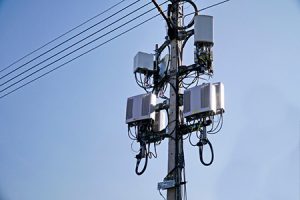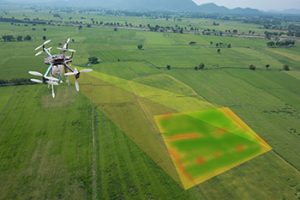
The fifth-generation wireless network, 5G, took the tech world by storm when it was first introduced, not only for its groundbreaking technology but also for its potential to change our daily lives. Did you know that GSMA Mobile Economy estimates the presence of 1.8 billion 5G connections meaning by 2025, one in five mobile phones will be utilizing a 5G network? Impressive, right? But if you are a business owner or an investor planning to open a new business, you might have asked yourself, “How is 5G going to improve and impact the growth of my business?”
To answer this question, we will start by listing some improved features that 5G enabled technology provides, such as faster download speed, reduced latency, greater bandwidth, which ultimately contribute to a positive user experience for you and your clients.
 It can easily and quickly allow you to provide a personalised user experience. The high speed that a 5G network connection provides will allow a state of the art technology such as Article Intelligence (AI) to process and analyse data faster than usual. As nowadays companies strive to provide their clients with a unique and personalised experience, 5G will allow these businesses to offer their customers a personalised shopping experience.
It can easily and quickly allow you to provide a personalised user experience. The high speed that a 5G network connection provides will allow a state of the art technology such as Article Intelligence (AI) to process and analyse data faster than usual. As nowadays companies strive to provide their clients with a unique and personalised experience, 5G will allow these businesses to offer their customers a personalised shopping experience.
Moreover, it can also increase the number of connected devices up to 100 times more than what is currently possible with 4G, leading towards complete automation.
The decreased latency of 5G contributes to higher productivity and efficiency. Latency measures the time required for the data to reach its target destination. The current 4G technology provides an average latency of 50ms (milliseconds), whereas 5G networks theoretically offer latency values lower than 1ms. However, in reality, we should expect latency values around 10ms.
As low latency contributes to an enhanced user experience, companies will have the opportunity to provide higher resolution images, videos, and audio, while eliminating frustrating problems such as glitches and lagging. For instance, for a business that relies on autonomous vehicles, the number of accidents or physical car damages might be substantially reduced, as, with the 5G connection, these cars will transmit the collected data faster to the cloud resulting in quicker responses.
 As mentioned above, the deployment of the 5G network will lead to drastic transformations and elevate the performance of new-age technologies such as Artificial Intelligence (AI), Machine Learning (ML), and major industries like Telecommunications and Agriculture. Hereafter, we will take a closer look at the predicted changes from the application of 5G in AI, ML, Telecom, and Agriculture.
As mentioned above, the deployment of the 5G network will lead to drastic transformations and elevate the performance of new-age technologies such as Artificial Intelligence (AI), Machine Learning (ML), and major industries like Telecommunications and Agriculture. Hereafter, we will take a closer look at the predicted changes from the application of 5G in AI, ML, Telecom, and Agriculture.
- Artificial Intelligence and Machine Learning
Artificial Intelligence in itself is revolutionising technology, and when embedded with 5G it will reach new heights to deliver an ultimate user-case experience. The implementation of 5G will considerably increase the number of sensors around us, providing high volumes of data to train and create advanced AI models. All these new sources of data will serve as an input to further train ML models to improve their decision-making process.
Moreover, the low latency offered by 5G will allow these large amounts of data to be processed closer to their source and enhance the performance of upcoming trends like on-device AI, which offers increased data security, privacy, and reliability.
- Telecommunications and 5G
The ongoing global pandemic reminded us that access to well established, fast, secure, and reliable internet connection is a must to remain connected and competitive nowadays. With mobile internet speeds of 10 gigabytes per second (Gbps), Telco companies will significantly improve the service that they offer to their clients, which will be able to instantly connect with their family employers, friends, and clients without being interrupted by poor connections.
- Precise Agriculture and Edge AI
 The usage of 4G sensors to measure, collect, and report on various parameters such as soil moisture, pH, nutrient levels, and organic matter have already enhanced crop productivity and reduced yield loss. Upgrading to 5G will enable farmers to have centralised control over their agricultural machines and real-time data analysis communicated at them. The large-scale implementation of this technology will allow farmers to prepare against unpredicted weather conditions and devastating pest attacks. Edge AI applications such as “Fafaza” a smart farming technique that can distinguish broadleaf weeds from crops and then individually treat the identified weed leaf with herbicide, will be widely distributed and lead to further innovations in this field.
The usage of 4G sensors to measure, collect, and report on various parameters such as soil moisture, pH, nutrient levels, and organic matter have already enhanced crop productivity and reduced yield loss. Upgrading to 5G will enable farmers to have centralised control over their agricultural machines and real-time data analysis communicated at them. The large-scale implementation of this technology will allow farmers to prepare against unpredicted weather conditions and devastating pest attacks. Edge AI applications such as “Fafaza” a smart farming technique that can distinguish broadleaf weeds from crops and then individually treat the identified weed leaf with herbicide, will be widely distributed and lead to further innovations in this field.
To conclude, the 5G connection will overall have a positive impact on business growth in terms of productivity, efficiency, and innovation. However, for businesses to fully harness the power of this novel technology, they ought to consult with their engineers to plan accordingly and incubate processes for the future.